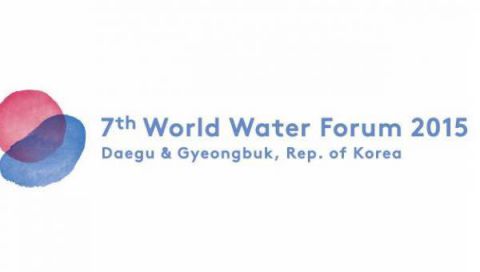Written by Kristel Malegue, Coordinator at Coalition Eau, May 2015

7th World Water Forum: The Forum of Disappointments
Weak processes, the side-lining of civil society, organisational issues … this year’s Forum failed to generate productive discussions with all sector stakeholders to advance the cause of water.
The 7th World Water Forum, which took place in South Korea from 12 to 17 April 2015, left civil society organisations with a bitter aftertaste. Although the World Water Forums are currently the only international, multi-stakeholder water-related events, their actual impact remains unclear and this latest Forum will be remembered for a number of shortcomings. Under the theme of ‘Water for our future’, the event was scheduled to focus on the implementation of solutions identified in the previous years’ Forum. Generally the Forum has been applauded for the outcomes and agreements reached, and yet, as civil society, we can’t help feeling the Forum was far from a success.
A Forum marked by the weakness of its processes
It is worrying that there has been no significant progress made on the political process since the last Forum. Ministerial Declarations adopted every 3 years are intended to act as a political catalyst for action. This year’s Declaration, adopted by 120 countries, is aligned with key issues in the international agenda, particularly the post-2015 framework and the Climate Change Conference COP21. However, there is a lack of visibility as to the actual scope of the Declaration, and despite announcements to the contrary, commitments made during the Forums have not been followed up on. The other processes, including the regional, thematic, science and technology streams of the Forum were very unequal, but always marked by the insufficient involvement of civil society, particularly voices from the global South. Moreover, the Forums need to be redesigned: with hundreds of sessions, many of these were poorly attended and held in virtually empty rooms.
A civil society that was effectively side-lined
This years’ Forum declared itself willing to involve civil society, notably by organising a Citizens’ Forum and providing financial support to cover travel expenses of partners from developing countries. However, the reality in no way lived up to original intentions, and was deemed to be a total failure. Firstly, the Citizens’ Forum was held in an entirely separate town to that of the main Forum, rendering the Citizens’ Forum space depressingly empty all week. Civil society organisations that had planned sessions and events to spread their messages and highlight expertise were the unfortunate victims of this fiasco. Moreover, the promised financial support was minimal and difficult to obtain, preventing civil society from both the global North and South from attending and taking part.

And the rest …
With hundreds of thousands of plastic water bottles being handed out at a Forum discussing water resource management and preservation, the environmental cost and impact of the World Water Forum is also of great concern. Aside from the issue of the financial cost of this type of event, we were struck by the mix of stands in the exhibition hall, as country stands were interspersed with the type of sales stands more commonly found at a trade show; again clearly showing a lack of priority space provided for civil society.
All these issues raise questions about the actual impact and value of the World Water Forums and civil society’s role within them. With the 8th World Water Forum to be held in Brasilia, Brazil in 2018, those involved in the Forum’s processes face major challenges. We call that they need to redress the situation to ensure water is placed at the top of the current international agenda, and is notably included in discussions on the post-2015 framework and climate change. The Forum’s political impact and their content need to be greatly improved. And finally, these events must involve civil society, particularly organisations from the global South, to ensure that people’s voices are heard.
Civil society organisations are no longer prepared to be associated with a ‘show’ Forum and its empty announcements and commitments. After the ‘time for solutions’ and the ‘time for implementation’ of the past two Forums, it is now vitally the ‘time for change’.
Coalition Eau is a member of End Water Poverty and is a network of 29 French non-governmental organisations working to promote universal and sustainable access to safe drinking water and sanitation, while preserving water resources. For more information, visit their website. Contact: Kristel Malegue, Coordinator on [email protected]